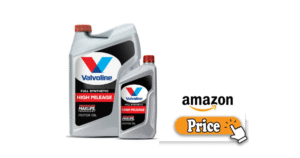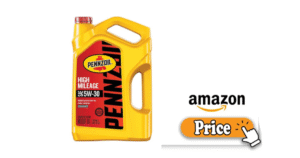Motor oil is the lifeblood of your engine. It keeps things running smoothly, reduces friction, and prolongs the life of your vehicle. Choosing the right oil brand can feel overwhelming with so many options available. Two industry giants, Valvoline and Pennzoil, stand out as trusted names in engine protection. But when it comes to Valvoline vs Pennzoil, which truly delivers superior performance?
Two industry giants, Valvoline and Pennzoil, stand out as trusted names in engine protection. But when it comes to Valvoline vs Pennzoil, which truly delivers superior performance?
In this in-depth guide, we’ll explain everything you need to know, from formulation and design to real-world experience, to help you decide which oil brand is right for your vehicle.
Introduction
Valvoline and Pennzoil are two of the most popular and trusted motor oil brands globally. Both offer a wide range of products for conventional, synthetic blend, and full synthetic needs.
Valvoline, founded in 1866, was the first trademarked motor oil brand in the U.S., while Pennzoil, established in 1913, has long been associated with high-performance engines, especially in motorsports.
As technology has evolved, so have these brands’ offerings, leading to fierce competition in the synthetic motor oil category. But which one stands up better under pressure?
Let’s find out.
What I Like About Valvoline
Valvoline has earned a strong reputation for a reason. Here are the standout features:
1. Innovative Additive Technology
Valvoline uses a high-quality detergent and dispersant blend that keeps engines cleaner for longer. Their synthetic oils are infused with anti-wear agents and thermal breakdown protection, making them ideal for modern engines.
2. Wide Range of Products
From Valvoline Advanced Full Synthetic to their popular High Mileage line, there’s a solution for virtually every engine type and condition.
3. Easy-to-Pour Packaging
The brand’s EZ pour bottles reduce spills and make oil changes smoother, a small but appreciated design touch.
4. Excellent High-Temperature Stability
Valvoline oils tend to perform well in high-heat environments, maintaining viscosity and preventing sludge formation.
What I Like About Pennzoil
Pennzoil has some impressive attributes of its own:
1. PurePlus® Technology
Pennzoil’s full synthetic motor oils are made from natural gas instead of crude oil. This process results in a clearer, cleaner base oil that reduces impurities and offers better performance.
2. Proven Engine Cleanliness
Independent testing shows Pennzoil Ultra Platinum can keep pistons up to 65% cleaner than the toughest industry standard.
3. Fuel Economy Benefits
Pennzoil synthetic oils often show improved fuel efficiency, thanks to low-friction properties that enhance engine performance.
4. OEM Approvals
Many major car manufacturers, including Ferrari, BMW, and Chrysler, recommend or factory-fill their vehicles with Pennzoil. 👉🏿👉🏻 Check Latest Price and Offer at Amazon 👈🏻👈🏿
👉🏿👉🏻 Check Latest Price and Offer at Amazon 👈🏻👈🏿
What Could Be Better
Valvoline Drawbacks
- Not as Many OEM Endorsements: While highly trusted, Valvoline doesn’t boast the same high-profile partnerships as Pennzoil.
- Slightly Lower Cleaning Power: While still excellent, some tests suggest that Pennzoil offers better piston cleanliness.
- More Traditional Formulation: Unlike Pennzoil’s gas-to-liquid process, Valvoline uses a more conventional oil refining technique.
Pennzoil Drawbacks
- Price: Pennzoil Ultra Platinum tends to be slightly more expensive, which can be a downside for budget-conscious users.
- Viscosity in Cold Weather: Some users report that it’s not as fast-flowing in extremely cold conditions compared to Valvoline.
- Bottle Design: The packaging is functional but less ergonomic compared to Valvoline’s EZ pour spouts.
My Personal Experience
Having used both brands over several years in different vehicles, including a high-mileage SUV and a performance sedan, here’s my honest take:
- With Valvoline, I noticed smoother starts in cold weather and a slight reduction in engine noise over time. The high-mileage formulation seemed to condition the seals well and reduce oil consumption.
- With Pennzoil, the engine felt cleaner after a few thousand miles. I also observed a small but noticeable improvement in MPG, around 2-3% better fuel economy over time.
Both brands are excellent, but I leaned toward Pennzoil for my newer vehicle due to the superior cleanliness and efficiency, while Valvoline remained my go-to for older, higher-mileage engines.
👉🏿👉🏻 Check Latest Price and Offer at Amazon 👈🏻👈🏿
Design: Bottle, Branding & Accessibility
Valvoline
- Sleek, color-coded labeling
- EZ Pour bottles with precision spouts
- Widely available in auto shops, supermarkets, and online
Pennzoil
- Bold branding, especially with their yellow-themed packaging
- Traditional bottle shape
- Also widely available, though specialty lines like Ultra Platinum may require an online order or a specialty store.e
Winner: Valvoline, for its ease-of-use bottle design and clear labeling.
Performance: Head-to-Head
Let’s break down Valvoline vs Pennzoil across key performance metrics.
| Feature | Valvoline Advanced Full Synthetic | Pennzoil Ultra Platinum |
| Base Oil | Conventional synthetic base | Natural gas (PurePlus®) |
| High Temp Stability | Excellent | Very Good |
| Cleaning Power | Very Good | Excellent |
| Fuel Efficiency | Good | Excellent |
| Engine Wear Protection | Excellent | Excellent |
| OEM Endorsements | Limited | Multiple OEMs |
| Cold Weather Performance | Excellent | Good |
Overall, Pennzoil edges out slightly in performance for newer engines, especially about cleanliness and fuel economy. However, Valvoline is a top performer for high-mileage and everyday use.
Build Quality of the Oil
Both brands meet or exceed industry standards, such as:
- API SN PLUS / SP
- ILSAC GF-6
- ACEA certifications (in select variants)
However, Pennzoil’s PurePlus® gas-to-liquid formulation arguably produces a cleaner, more refined base oil, which contributes to longer intervals between changes and less sludge buildup.
Valvoline, on the other hand, adds strong friction modifiers and conditioners for enhanced durability, particularly in older engines.
Both brands feature high-quality additive packages, and it’s safe to say there are no corners cut on formulation. If engine longevity and cleaning efficiency are your priorities, Pennzoil takes the lead.
Alternative Option: Mobil 1
If you’re considering another option, Mobil 1 is a strong third contender. It’s widely endorsed by automakers, known for extended performance intervals (up to 15,000 miles), and delivers consistently strong performance in extreme temperatures.
However, it’s usually more expensive than both Valvoline and Pennzoil and may not offer noticeably better performance unless you’re pushing your engine hard or driving in harsh conditions.
Read More: Kirkland vs Mobil 1 Oil: Which Motor Oil Is Right for You?
Final Thought: Which Oil Is Right for You?
Choose Valvoline if:
- You drive a high-mileage vehicle
- You want excellent cold-weather performance
- You prefer an easy DIY oil change with mess-free packaging
- You need reliable performance at a lower price point
Choose Pennzoil if:
- You drive a newer engine or a performance car
- You want the cleanest engine internals
- You’re looking for the best fuel economy and OEM endorsements
- You don’t mind paying a little more for r cutting-edge formulation
At the end of the day, both brands are top-tier choices. Your decision may ultimately come down to vehicle age, climate, driving style, and personal preference.
FAQs: Valvoline vs Pennzoil
Q1: Can I switch between Valvoline and Pennzoil?
A: Yes, as long as the oil viscosity (e.g., 5W-30) and specs match your car’s requirements, switching between brands is safe.
Q2: Is Pennzoil Ultra Platinum worth the higher price?
A: For newer engines or performance vehicles, yes, it offers exceptional cleanliness and slight fuel efficiency gains.
Q3: Which oil lasts longer between changes?
A: Pennzoil’s Ultra Platinum is often rated for longer intervals (up to 10,000 miles), but Valvoline’s high-mileage and synthetic formulas also perform well up to 7,500 miles.
Q4: Which is better for cold climates?
A: Valvoline typically performs slightly better in freezing temperatures due to faster cold-start lubrication.
Q5: Do either of these void my car’s warranty?
A: No, as long as you use the correct viscosity and meet manufacturer requirements (check your owner’s manual), both Valvoline and Pennzoil are warranty-safe.
Verdict: Pennzoil takes a slight edge in innovation and engine cleanliness, while Valvoline offers reliable performance, especially for older vehicles. You really can’t go wrong with either, but the right choice depends on your car and your priorities.




